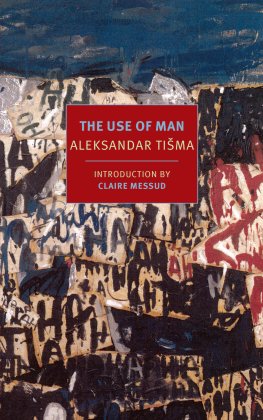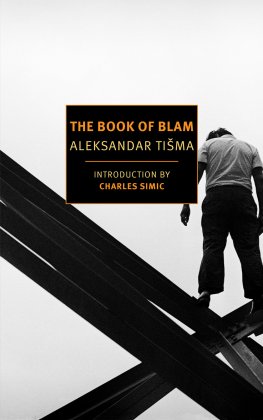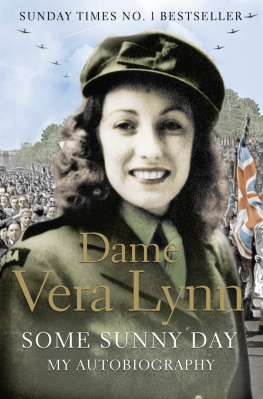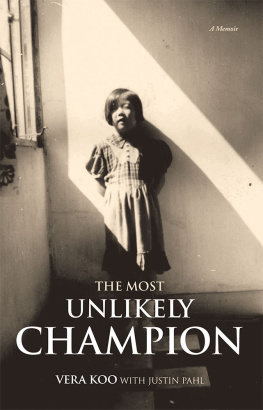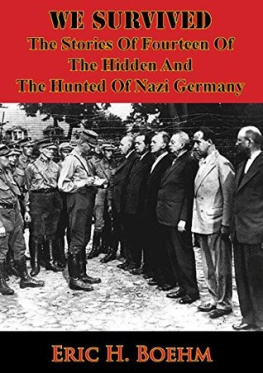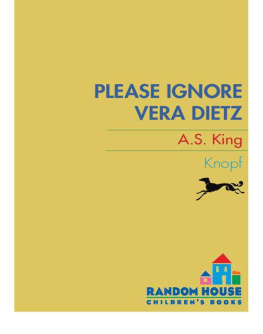Aleksandar Tišma - The Use of Man
Here you can read online Aleksandar Tišma - The Use of Man full text of the book (entire story) in english for free. Download pdf and epub, get meaning, cover and reviews about this ebook. year: 2014, publisher: NYRB Classics, genre: Prose. Description of the work, (preface) as well as reviews are available. Best literature library LitArk.com created for fans of good reading and offers a wide selection of genres:
Romance novel
Science fiction
Adventure
Detective
Science
History
Home and family
Prose
Art
Politics
Computer
Non-fiction
Religion
Business
Children
Humor
Choose a favorite category and find really read worthwhile books. Enjoy immersion in the world of imagination, feel the emotions of the characters or learn something new for yourself, make an fascinating discovery.
- Book:The Use of Man
- Author:
- Publisher:NYRB Classics
- Genre:
- Year:2014
- Rating:3 / 5
- Favourites:Add to favourites
- Your mark:
- 60
- 1
- 2
- 3
- 4
- 5
The Use of Man: summary, description and annotation
We offer to read an annotation, description, summary or preface (depends on what the author of the book "The Use of Man" wrote himself). If you haven't found the necessary information about the book — write in the comments, we will try to find it.
The Use of Man — read online for free the complete book (whole text) full work
Below is the text of the book, divided by pages. System saving the place of the last page read, allows you to conveniently read the book "The Use of Man" online for free, without having to search again every time where you left off. Put a bookmark, and you can go to the page where you finished reading at any time.
Font size:
Interval:
Bookmark:
Aleksandar Tima
The Use of Man
BIOGRAPHICAL NOTES
ALEKSANDAR TI MA (19242003) was born in the Vojvodina, a former province of the Austro-Hungarian Empire that had been incorporated into the new Kingdom of Yugoslavia after the First World War. His father, a Serb, came from a peasant background; his mother was middle-class and Jewish. The family lived comfortably, and Tima received a good education. In 1941, Hungary annexed Vojvodina; the next year Timas last in high school the regime carried out a series of murderous pogroms, killing some 3,000 inhabitants, primarily Serbs and Jews, though the Timas were spared. After fighting for the Yugoslav partisans, Tima studied philosophy at Belgrade University and went into journalism and in 1949 joined the editorial staff of a publishing house, where he remained until his retirement in 1980. Tima published his first story, Ibikas House, in 1951; it was followed by the novels Guilt and In Search of the Dark Girl and a collection of stories, Violence. In the 1970s and 80s, he gained international recognition with the publication of his Novi Sad trilogy: The Book of Blam (1971), about a survivor of the Hungarian occupation of Novi Sad; The Use of Man (1976), which follows a group of friends through the Second World War and after; and Kapo (1987), the story of a Jew raised as a Catholic who becomes a guard in a German concentration camp. Tima moved to France after the outbreak of war and collapse of Yugoslavia in the early 1990s, but in 1995 he returned to Novi Sad, where he spent his last years.
BERNARD JOHNSON (19332003) was affiliated with the Language Centre at the London School of Economics for many years. In 1970 he edited and translated the first anthology of modern Yugoslav literature, and throughout his career he distinguished himself as one of the most active translators of Serbo-Croatian poetry and prose working in English.
CLAIRE MESSUD is the author of four novels and a book of novellas. Her novel The Emperors Children was long-listed for the Man Booker Prize, and was selected as one of the ten best books of 2006 by The New York Times. Her most recent novel is The Woman Upstairs. She lives with her family in Cambridge, Massachusetts.
INTRODUCTION
What is literature? Potentially, everything; possibly, nothing at all.
Aleksandar Tima may have been more acutely aware of these stakes than most, on account of his talent and temperament, and also as a result of the accident of his birth. The son of a Serbian father and Jewish mother, he was born in 1924, and spent his childhood in Novi Sad, a city on the banks of the Danube, in what was then Yugoslavia. He grew up surrounded with memories of war, in the likely anticipation of war, and in the midst of war.
The war brought particular confusion to Novi Sad, where Serbs, Croats, Hungarians, Germans, and Jews had long lived together and intermarried. Annexed by Hungary in 1941, the city was the site of an especially brutal massacre in January 1942, in which approximately 2,500 people were slaughtered, 800 of them Jews. In October 1944, Novi Sad was reclaimed by Communist partisans, becoming a part of Titos Communist Yugoslavia. Tima lived through all these upheavals, and inevitably they determined his subject matter. He could be called the Bard of Novi Sad, petit-matre of a small canvas; though in a profound sense his fierce, often brutal stories of this provincial life are the central stories of the twentieth century. They resonate far beyond Novi Sads borders, forcing us to look again, to look more closely, at our frail humanity.
Against mayhem and horror, what is there to say? Timas ruthlessly unsentimental fictions would seem to assert the necessity not only of bearing witness but of bearing witness to all the shades of guilt with which atrocity taints its perpetrators and its victims. Tima is careful neither to condemn nor to exonerate: rather, he insists upon the humanity of each of us, however heinous our acts. In the novel Kapo, for example, he explores the late-life reflections and recollections of Lamian, a Jew from Novi Sad who, denying his parents and heritage and assuming the identity of a dead man, survived in the camps and who as a Kapo committed brutal crimes against his fellow men and, particularly, women. Since the war, Lamian has lived in hiding and fear, warped by guilt and by the terror of being unmasked. Ironically or perhaps logically he turns to one of his surviving victims, a Jewish woman of almost his own age, in hopes of redemption.
I know few if any novels as blisteringly powerful as Kapo. It provokes continual discomfort and is genuinely, deeply shocking. Above all, it shocks by implicating the reader Baudelaires hypocrite lecteur, mon semblable, mon frrein its story of violence to others and to self. We are forced to acknowledge that this, too, is our human condition. Much as we seek to separate ourselves from the unsavory Lamian, who can say with certainty that we could not have ended up like him?
Lamian has become a monster as a result of his own choices, you might say; but what were they? Condemned by a German soldier to stand at length outside in winter in a drenched coat, he was effectively given the choice either to become a Kapo or to die.
The power of the club, though he obediently used it, could not make him exult, because he did not wield it with desire because he had become Kapo Furfa by freezing beneath the coat of ice which Corporal Sommer had put on him, but beneath that ice, beneath the Kapos insignia and red triangle, he was really Lamian, a Jew with no yellow star sewn on him, whose heart quaked in fear and horror as he beat those to whom he secretly belonged.
Over the course of the war, Lamian was forced to choose, and choose again, simply to live and with each choice came greater crimes and more profound self-loathing.
The Book of Blam is about a different kind of survivor and a different kind of guilt. In it, Miroslav Blam, a Jew married to a Christian and thus spared deportation and execution, recalls the years of his youth. Unlike Lamian, Blam is not guilty of heinous crimes. But he, too, has been mutilated by his survival, in his case by his careful, timorous passivity. He has lost his parents and closest friends to the war; repeatedly cuckolded by his indifferent wife, he has raised as his own a child fathered by a collaborator. In the years after the war he has seen Novi Sad transformed almost beyond recognition, into what appears to be a thriving, untroubled modern city. He wanders in a lost geography, the city of his memories, full of regrets and resentments. Lamian chose to survive; Blam just survived. The legacy, for him, is very different from Lamians, but no less painful.
From that time, from that place, as Timas novels make horridly clear, barely a soul emerged undisgraced or uncompromised. To survive was to compromise. The only clean souls were dead souls. (This is a truth known to most Europeans of a certain age.) Tima does not exempt his characters from moral accountability, but he sees, detachedly and with austere compassion, the tremendous costs of life.
Nowhere are these more apparent than in The Use of Man, Timas masterpiece. At the heart of the novel is a book a modest diary, one of several books that play important roles in the novel. Curiously, they are at once central to the plot (the diary in particular) and ineffectual, motivators and bystanders, rather like people themselves. What are books good for? One of the novels characters, a thoughtful and retiring middle-aged Jewish patriarch named Robert Kroner says, to his daughters boyfriend, about Goethe: We have no men and writers like that today. Mysticism now rules the world, the cult of blood and violence, darkness, the longing for the past, nationalism. Do you think that anything great and noble, like this book, can come out of such chaos? No; youll see, our time will be remembered for its barbarity and barrenness.
Font size:
Interval:
Bookmark:
Similar books «The Use of Man»
Look at similar books to The Use of Man. We have selected literature similar in name and meaning in the hope of providing readers with more options to find new, interesting, not yet read works.
Discussion, reviews of the book The Use of Man and just readers' own opinions. Leave your comments, write what you think about the work, its meaning or the main characters. Specify what exactly you liked and what you didn't like, and why you think so.

